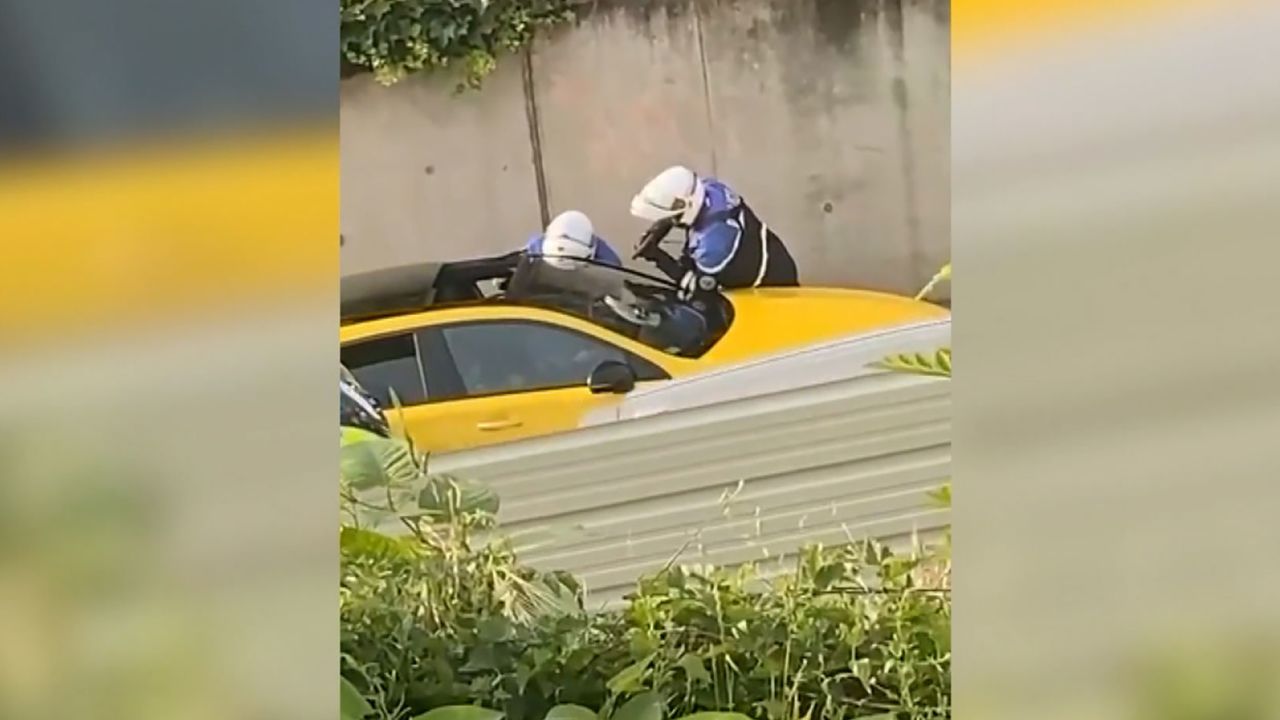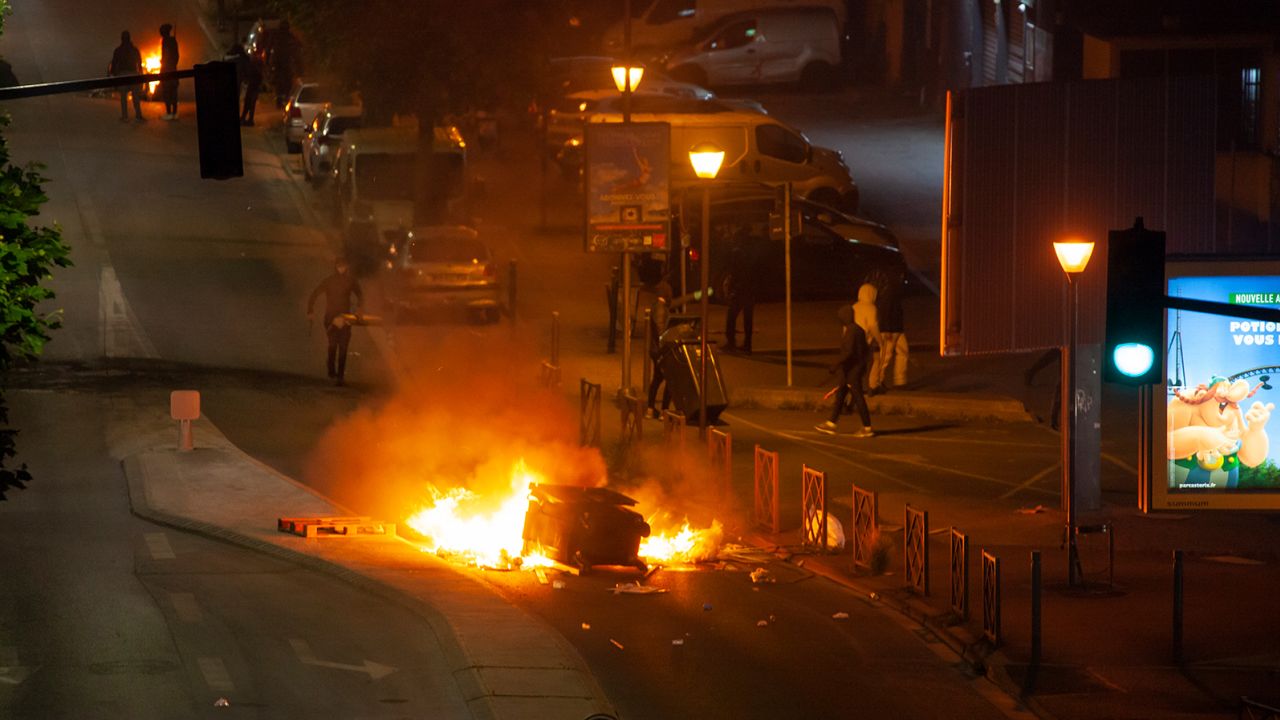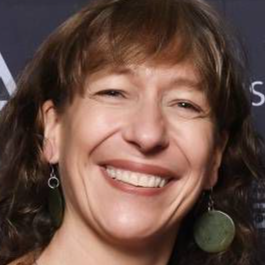Nanterre, France
CNN
—
The mother of a 17-year-old killed by French police said she blames only the officer who shot her son for his death, a tragedy that has sparked three consecutive nights of destructive unrest and revived a heated debate about discrimination and policing in low-income, multi-ethnic communities.
The boy, Nahel, was shot dead during a traffic stop Tuesday morning in the Paris suburb of Nanterre. Footage of the incident filmed by a bystander showed two officers standing on the driver’s side of the car, one of whom fired his gun at the driver despite not appearing to be in any immediate danger.
The officer said he fired his gun out of fear that the boy would run someone over with the car, according to Nanterre prosecutor Pascal Prache.
“I don’t blame the police, I blame one person, the one who took my son’s life,” Nahel’s mother, Mounia, told television station France 5 in an on-camera interview.
Prache said that it is believed the officer acted illegally in using his weapon. He is currently facing a formal investigation for voluntary homicide and has been placed in preliminary detention.

Protests flare overnight
Despite calls from top officials for patience to allow time for the justice system to run its course, a sizable number of people across France remain shocked and angry, especially young men and women of color who have been victims of discrimination by police.
That anger has, for three nights in a row, given way to violent protests across the nation.
Ahead of another expected night of unrest, French Interior Minister Gerald Darmanin said 45,000 policemen would deploy across France on Friday, and that he is also mobilizing more special units, armored vehicles and helicopters.
Some 917 people were detained following overnight violence on Thursday, including 13 children, Darmanin told French TV channel TF1.
The death of the young man “cannot justify the disorder and the delinquency,” the minister added.

Confrontations flared between protesters and police in Nanterre on Thursday, where a bank was set on fire and graffiti saying “vengeance pour Nael” (using an alternative spelling of his name) was spray painted on a wall nearby.
Overseas French territories have also witnessed protests. A man was killed by a “stray bullet” in Cayenne, capital of French Guiana, during riots on Thursday.
Scars from three days of protests were clear in the suburb on Friday, as was the acrid smell left behind by burning detritus, which was being removed. Streets remained charred where burning cars used to be, with patches of graffiti calling on justice for Nahel and insulting the police. Near the site of a pitched battle with police, a smattering of dug-up bricks, tear gas canisters, rubber bullets and metal barriers remain splayed about.
Across the country, 200 government buildings were vandalized on Thursday night, according to the French Interior Ministry.
All “large-scale events” in France have been banned as of Friday afternoon, and bus and tram services across faced a nationwide shutdown ordered for 9 p.m. on Friday evening.
In Britain, authorities issued a travel warning due to “violent” riots targeting “shops, public buildings and parked cars.” They also cautioned disruptions to road travel, local transportation and the implementation of curfews.
The German government expressed “concern” over the nationwide protests in France, adding there was no indication that Macron would cancel an upcoming state visit to Berlin.
Macron flies back from summit
The violence has prompted President Emmanuel Macron to hold a crisis meeting the second day in a row, BFMTV reported, as his government tries to avoid a repeat of 2005. The deaths of two teenage boys hiding from police that year sparked three weeks of rioting and prompted the government to call a state of emergency.
He had returned from a European Council summit on Thursday in Brussels to convene the crisis meeting.
The French president called for calm and asked parents to take responsibility for their children amid the unrest. He said the situation is “unacceptable” and “unjustifiable, especially when the violence is targeting public building.”
A third of the almost 900 people detained overnight are young, Macron told reporters at the Interior Ministry. Authorities will be investigating the role of social media in inciting the riots, and there will be further “measures” announced in the coming hours, he added.
Continued unrest would be a major blow to the government’s agenda. Macron and his ministers have spent much of the year dealing with the fallout of pushing through extremely unpopular pension reforms that were divisive enough that the government felt it necessary to launch a 100-day plan to heal and unite the country.
That deadline is up on July 14, France’s national day.
Macron attended an Elton John concert in Paris on Wednesday, even as the demonstrations boiled over.
Elton John’s husband, David Furnish posted a picture on Instagram on Thursday of himself and Elton John smiling backstage with the French president and his wife, Brigitte Macron after the show at the Accor Arena.
If Macron’s government is to address allegations of institutional racism in response to Nahel’s death, it will be a tough balancing act.
The UN High Commissioner for Human Rights called on France to address “deep issues of racism and discrimination in law enforcement’ on Friday, a statement the French Ministry of Foreign Affairs described as “totally unfounded.”
The ministry described law enforcement in France as subject to various levels of “judicial control that few countries have.
“France, and its police forces, fight with determination against racism and all forms of discrimination. There can be no doubt about this commitment,” the ministry added. “The use of force by the national police and gendarmerie is governed by the principles of absolute necessity and proportionality, strictly framed and controlled.”
‘He saw an Arab face … and wanted to take his life’
Race and discrimination are always tricky political issues, but in France they are particularly challenging due to the country’s unique brand of secularism, which seeks to ensure equality for all by removing markers of difference, rendering all citizens French first.
In practice, however, that vigorous adherence to French Republicanism often prevents the government from doing anything that would appear to differentiate French citizens on the basis of race, including collecting statistics.
Mounia, like other activists, believes her son’s race was a factor in his killing. French media have reported that Nahel was of Algerian descent, and the country’s Foreign Ministry on Thursday issued a statement extending its condolences to Nahel’s family.
“He saw an Arab face, a little kid, and wanted to take his life,” she said, referring to the police officer who fired their weapon.
“Killing youngsters like this, how long is this going to last?” she added. “How many mothers are going to be like me? What are they waiting for?”
While the government’s approach has so far been cautious, left-wing politicians and some activists have called for police reform, including abolishing a 2017 law that allowed police greater leeway in when they can use firearms.
Laurent-Franck Lienard, the lawyer of the officer accused of shooting Nahel, told French radio station RTL that his client acted in “compliance of the law.” He claimed his client’s prosecution was “political” and being used as a way to calm the violent tensions.
He added that his client was “devastated” by Nahel’s death and he did not want to kill him.
“He committed an act in a second, in a fraction of a second. Perhaps he made a mistake, justice will tell,” Lienard said.
CNN’s Xiaofei Xu, Niamh Kennedy, Teele Rebane, Isaac Yee, Helen Regan and Lindsay Isaac contributed reporting.





